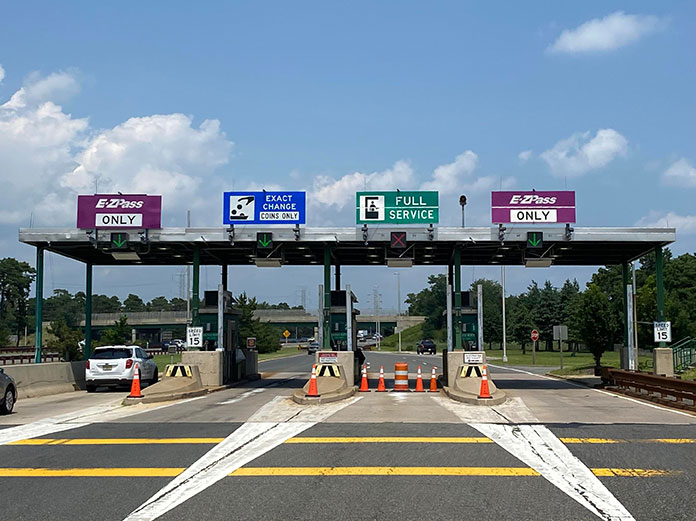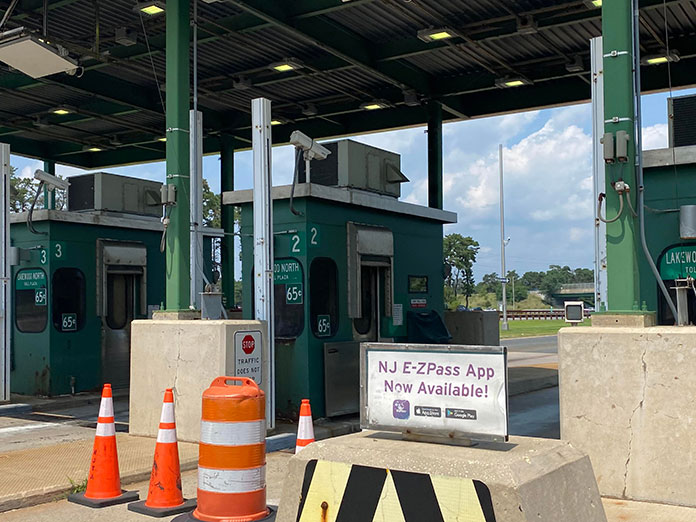
NEW JERSEY – The gift of a toll hike is one present Garden State travelers would rather return this holiday season.
Toll price increases were approved at 3% by the commissioners of the New Jersey Turnpike Authority (NJTA) and will start on January 1. The commissioners approved a 2020 plan that allows for annual toll increases.
NJTA spokesman Tom Feeny said the purpose behind the current increase is to provide a stable funding source for capital need. The added revenue will supplement work being performed as part of the Authority’s long-term capital program.
The parkway toll increase will have drivers of passenger vehicles at most of the main toll plazas at around six cents to $1.96 for those with E-ZPass and $2 for cash users since all tolls are rounded up to the nearest nickel for drivers paying in cash.
The Toms River toll for example will jump two cents from 95 to 97 cents.
Tolls for the largest truck class will increase to $11.79 for E-ZPass and for those paying in cash, $11.80 at most toll plazas.
Turnpike drivers of passenger cars will now have to pay $19.42 to drive from exit 1 to exit 18W which is an increase from $18.85. That price is lower with E-ZPass during non-peak hours. Peak hours are between 7 and 9 a.m. or 4:30 and 6:30 p.m.
E-ZPass users driving passenger cars will increase from $14.15 to $14.57. Truck drivers who travel through the turnpike will be hit with a $2 plus increase jumping to $79.62. Using E-ZPass that would be $69.11.
An earlier hike went into effect in September 2020 which raised tolls by 36% on the Turnpike and 27% on the Parkway.
Members of the Ocean County Board of Commissioners were not pleased by the news and during their most recent meeting spoke out against the increase. Commissioner Joseph Vicari had been critical of the plan when it was first announced last year. He noted that the toll increases were coming at a time when gas prices around the nation had also increased which would add to the cost of driving.
In a letter to NJTA Chairwoman Guiterrez-Saccetti, Vicari wrote that the increase, “comes just 15 months after tolls jumped by 27 percent in September 2020. Those increases are especially unfair to Ocean County commuters, who tend to travel farther on the Parkway because of the greater distances between our communities and the professional hubs of northern New Jersey and New York City.”

He added, “the lack of a public transportation network similar to the ones that blanket the northern counties also forces our commuters to rely on their vehicles. On top of this our residents continue to struggle with the economic downturn caused by the ongoing COVID-19 crisis.”
Vicari added in an interview with Jersey Shore Online.com that this was the wrong time for such a hike. “This toll hike is another burden on them with the high costs of gas and food and we in Ocean County have the largest stretch of the Parkway. We don’t have mass transportation here.”
He also opposed the concept of “automatic raises. There should be a statewide referendum concerning this. There was no public input just another hand of government in everyone’s pocket.” The commissioner has also been calling for a representative on the Authority who is from Ocean County or Monmouth County to speak on behalf of this region. “It doesn’t matter if they are a Republican or Democrat, we need a representative.”
Vicari wasn’t the only local Republican who expressed opposition to the latest NJTA toll increase announcement. Ninth District Senator Christopher Connors, Assemblyman Brian Rumpf and Assemblywoman DiAnne Gove called on Trenton to end the automatic toll increases.
The 9th District Delegation called upon the governor to veto the minutes of any meetings held by the NJTA and the South Jersey Transportation Authority (SJTA) which approved toll increases on the Garden State Parkway, the New Jersey Turnpike, and/or the Atlantic City Expressway.
“Commuters cannot afford to pay higher tolls at a time when prices are increasing for consumer goods across the board. Businesses in the state which are trying to remain competitive with other tax-friendly states will have yet another cost increase imposed by Trenton to contend with, making it that much harder to be profitable,” they said in a joint statement.
“New Jerseyans will recall that these toll hikes, which were approved in the early months of the pandemic, conveniently and deliberately limited opportunity for public scrutiny while living up to Trenton’s abysmal record on transparency,” they said. “Justifiably, our Delegation called out Trenton and demanded that the toll hikes be vetoed by the Governor as we also worked to keep our constituents apprised of the situation – as much of the public’s focus was directed to COVID-related issues at the time.”
The lawmakers said residents shouldn’t “believe the hollow words of officials who claim to be standing up for the middle class while, at the same time, support toll hike increases or do nothing to stop them. During the holidays, many of our constituents are now forced to ask how they are going to afford yet another cost increase.”
The lawmakers added, “most residents of urban areas with access to mass transit will not only largely escape the financial hit from the toll hikes but will likely benefit from the revenue generated which will undoubtedly be siphoned off for mass transit projects. The timing also inured to Trenton’s benefit, as the toll hikes are set to take effect in January 2022, two months after the gubernatorial and state legislative elections.”
They stated, “after the results of the recent election, we sincerely hope that Trenton received a wake-up call that the status quo of obscene levels of taxing, spending, and borrowing will be met with more intensified resistance by those who understand that the state’s current fiscal trajectory is unsustainable and reckless.”
Last year toll revenue decreased by 60% after people traveled less during the height of the COVID-19 pandemic. The increases are part of the agency’s budget for next year when traffic is expected to rise to around 97% of its pre-pandemic levels.
According to the NJTA, revenues are expected to increase by 7% in 2022 and if that proves correct, this would represent a strong benefit for the board’s next budget.






